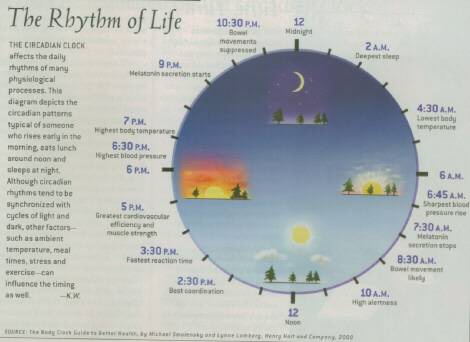The answer to your question is - surprisingly - both. This is apparently because your habits may have arisen because of your biology.
Recent research by Kanazawa and Perina, of The London School of Economics; University College, London and Birkbeck College, London has found that people who prefer to stay up late (presumably because that is when their concentration is better) demonstrate "a higher level of cognitive complexity".
Circadian rhythms appear to be an area in which individual preferences can take precedence over genetic predispositions, and humans are alone in being able to cognitively override their internal biological clock.

Obviously, it is only through the availability of artificial light that we are able to choose to stay awake, and work all night if we want to - and so this behaviour might be viewed as being evolutionary.
Kanazawa and Perina wanted to find out if intelligent individuals were more likely to "espouse novel evolutionary values" than less intelligent people, and their conclusion was as follows:
...more intelligent individuals are more likely to be nocturnal than less intelligent individuals.
You can read the research paper in full, here.
However, while night owls like the ones featured in the Edward Hopper painting, Nighthawks, can possibly congratulate themselves on being cleverer than their early-bird friends and relatives, it's not all good news in the late-night camp.

Much appears to depend on whether you sleep for long enough each night (or day!), and whether your sleep is disturbed or not.
For example, research has shown that sleep disturbance or deprivation can have more serious health effects than just the irritability and tiredness you might expect.
Scientists at The University of Bristol conducted a study into the effect of sleep disturbance and shortage on volunteers, whose brains were scanned to observe the effects on their temporal lobes.

The temporal lobe plays a critical role in memory, and the brains of those who were most sleep-deprived had shrunk, leading both to worse memories, and to higher levels of the stress hormone, cortisol.
Apparently, past research has shown that the chronic high levels of cortisol which are often found in people suffering from Post-Traumatic Stress Disorder, or from severe depression, cause shrinkage of the brain.
Getting less than eight hours' sleep is thought to lead to a lower I.Q. the next day, and those who work night shifts suffer an increased risk of ulcers and diabetes (as well as divorce!).
Irregular sleeping patterns are also thought to lead to dangerously-high levels of glucose and fat in the blood, after meals.
So, if you're a night owl, and find that you concentrate better late in the wee small hours, I'm guessing that's fine - as long as you have a regular sleep pattern and make sure that you get eight hours' sleep a night (or day).